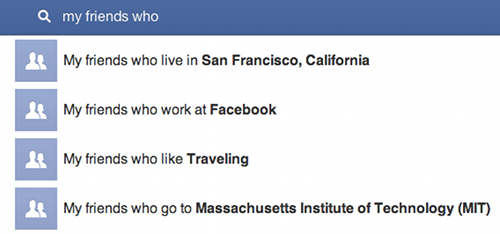What Facebook Graph Search means for business
What Facebook Graph Search means for business

Facebook Graph Search in action
Facebook took a big step towards becoming a social search engine this week when it announced Graph Search, a tool to help users find content on the social network.
As Graph Search becomes more widely available, it could have big implications for how businesses use Facebook.
What is Graph Search?
Facebook defines its graph as being the map of relationships between everyone using the service. The graph is huge. It contains data about more than a billion people, over 240 billion photos and information about over a trillion connections.
Graph Search is Facebook's first real attempt to provide anything more than basic search tools. The company does a good job of explaining it in the official press release:
"Graph Search and web search are very different. Web search is designed to take a set of keywords (for example: “hip hop”) and provide the best possible results that match those keywords. With Graph Search you combine phrases (for example: "my friends in New York who like Jay-Z") to get that set of people, places, photos or other content that's been shared on Facebook. We believe they have very different uses."
Graph Search results will take into account the connections and privacy settings of individual users, so when you search you'll only be able to see things you'd be able to see elsewhere on Facebook.
The function isn't widely available yet, but if you want to try it you can join the waiting list here.
What can I find with Graph Search?
Graph Search is currently focused on helping users find four main things: people, places, photos and interests. Graph Search examples suggested by Facebook include:
- 'Restaurants in London my friends have been to'
- 'People who like cycling and are from my home town'
- 'Photos of my friends in New York'
But make no mistake, this is just the start of Facebook's efforts to do more with its most valuable asset - the graph - and you can expect this to evolve into a really powerful tool over the next few months.
What does Graph Search mean for businesses?
It doesn't take a great deal of imagination to see that Graph Search could significantly influence how potential customers find businesses.
Take the first bullet point above: 'restaurants in London my friends have been to'. If you run a restaurant and you're not listed on Facebook, you don't have any chance of appearing in the results, even if you have five star reviews and thousands of satisfied customers.
In simple terms, Graph Search could make it more important that you keep your company's Facebook page up-to-date and interesting.
Getting 'likes' on Facebook might become more important too, as Facebook may use these to determine Graph Search rankings.
Will Graph Search work in reverse?
There's obviously potential here for Facebook to let businesses use Graph Search to identify potential customers via searches like:
- 'People who like eating in central London restaurants'
- 'People who have been on holiday to the Lake District more than once'
- 'People who have recently moved to Bristol'
Sure, Facebook already offers significant targeting options to advertisers. But Graph Search has the potential to make targeting both easier and more accurate.
It remains to be seen how the site's users will respond to to all this. But there's no doubt that for Facebook itself, the graph is a valuable asset. It's how the company hopes to make big money in the years ahead.




Comments
Add a comment